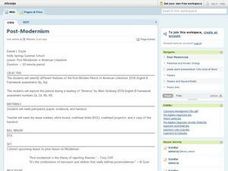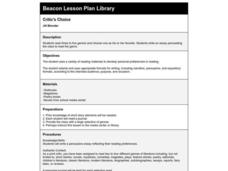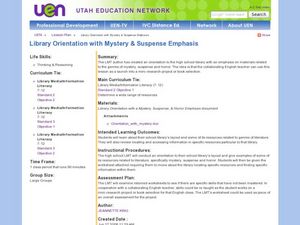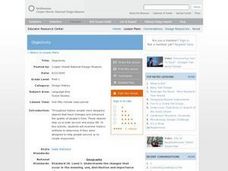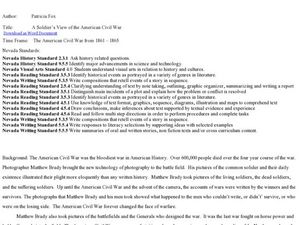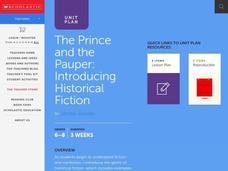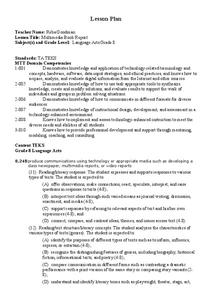Curated OER
Would You Like to Become a Millionaire?
Students answer questions written by other teams about literature in an attempt to become "millionaires." In small groups they write a motivational introduction to their teams selected books, publish their questions as a HyperCard...
Curated OER
Horror Tales: What Makes Them Spooky?
Before you jump into this activity, be aware there is little to work with. That being said, the ideas are solid and will be brought to life with a little Halloween spirit. Learners examine horror as a sub-genre, and contemplate what...
Curated OER
Small Actions with Big Results
Learners explore philanthropy in literature. In this literature instructional activity, students read text from three different genres that all have a moral. Learners compare and contrast these pieces of literature, focusing on the...
Curated OER
Folk Genres
Students classify folk life traditions into folk genres. They create folk genre museums by laying down their images or postcards wherever they see a relationship. They give each an image to examine in depth and decide which folk genre...
Curated OER
TOTAL LITERATURE SERIES
Fifth graders listen and react to the book Number the Stars, by Lois Lowry. They write in their journals every day approximately one page or more as a reflection on the reading.
Curated OER
What Genre Am I?
First graders differentiate between different pieces of literary genres by participating in a hands-on activity. This includes a student assessment sheet.
Curated OER
MONSTERS AND MYTHS: SCRIPTS /SCULPTS
Seventh graders are introduced to myths formed by many cultures as a unique genre of literature. They use critical thinking skills to compare and contrast mythic tales, compare versions of the same story, and respond to literature in...
Curated OER
Post- Modernism
Students participate in a lesson that investigates post-modernism in American literature. They conduct the lesson with the help of reading "America" by Ginsberg to create context. Then students define the genre and the culture that has...
Curated OER
Critic's Choice
Third graders read three to five genres and choose one as a favorite. They write an essay persuading the class to read the genre. This lesson plan serves as a nice introduction to different styles of literature.
Curated OER
Kid Lit Crit
Students explore different types of student literature; they then write their own fiction pieces, in either fantasy/adventure or memoir/realism style.
Curated OER
Literature in the Library
High schoolers get familiar with their school library. In this library orientation instructional activity, students explore the layout of the library and challenge high schoolers to locate literature materials in a scavenger hunt activity.
Curated OER
Analyzing Elements of a Memoir
Learners analyze and identify elements of memoirs. In this literature lesson plan students explore qualities to listen for while the teacher reads a memoir; they then break into groups and analyze a memoir independently.
Curated OER
Objectivity
Help young readers examine historic artifacts to determine if they were designed to help people survive or to create enjoyment. They identify objects that were designed to help people to survive and to enjoy themselves. Then compare and...
Curated OER
Mystery Lessons
Learn about mysteries with your readers. They will investigate plot, basic elements of mystery, famous characters, and become familiar with genre vocabulary. Bring in props and mystery books to begin and then have learners create story...
Curated OER
A Soldier's View of the American Civil War
Study and research the American Civil War in this explanatory writing lesson. Middle schoolers complete six activities to learn about the American Civil War and soldiers' views of the war. The lesson includes several options to complete...
Curated OER
Analyzing the Use of Irony in a Short Story
Ninth graders examine how literature connects to real-life and see how irony aids in the development of theme. They read Shirley Jackson's The Lottery, and discuss elements of foreshadowing and situational irony. Then learners will write...
Curated OER
My Writing Portfolio
Emerging writers create a portfolio showcasing various writing formats. They discuss Alexander and the Terrible, Horrible, No Good, Very Bad Day. They observe the key features of picture books and then create their own book to add...
Curated OER
Pick a Pet
Students design informational materials to educate people on the importance of matching a new pet to the family's lifestyle and living arrangements. Students use critical thinking skills to make a decision on the appropriate choice for a...
Curated OER
Science Fiction
Students write a science fiction story. In this science fiction lesson, students read selections of science fiction and compare them to supernatural stories from the Bible. Students identify themes and discuss elements that...
Gwinnett County Public Schools
Analysis of the Tuck Everlasting and The Birchbark House Text Exemplars
Looking to introduce some text-based questions into your ELA lessons? Practice the kinds of skills the Common Core demands with the seven text-based questions and the essay prompt provided here. Designed to be a three-day lesson, day one...
Curated OER
The Prince and the Pauper
Mark Twain, the famous American author, is often studied in the school system. Use "The Prince and the Pauper" to analyze the differences between the text and its video version. This lesson includes several culminating project...
Curated OER
Multimedia Book Report
Young readers plan and draft a book report focusing on the five key components of a novel: plot, character, setting, conflict, and theme. After completing a story board, pupils then prepare a PowerPoint book report that is shown to the...
Curated OER
Checkmate
Students start identifying the cause and effect relationships in games of Chess. Using the internet, they research the history of the game and how the roles for each of the pieces. They develop a skit based on the roles and...
Curated OER
Poet Naomi Shihab Nye
Learners read and analyze poetry by Naomi Shihab Nye. They define stereotypes, view and discuss a video interview with Nye, present an oral reading of a poem, and write a persuasive letter to an author.







